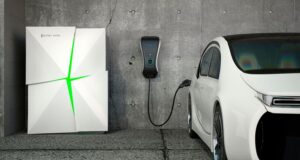What Is an EV Charging Station?
The ordinary customer may be intimidated by the concept of an electric vehicle (EV), not due to a lack of desire but due to a misunderstanding about how to power it. Every owner must grasp how an electric vehicle charging station operates for this reason.
A charger for electric cars is a piece of equipment which provides electricity to electric automobiles. Its primary function is to recharge the battery of an electric vehicle to keep it in motion.
Some electric cars feature a charger that converts alternating current (AC) energy into direct current (DC) and then transfers this power to the vehicle’s charging port, but the batteries of the majority of certain unique vehicles can only be charged using direct current (DC) power.
Types of EV Charging Stations
Various kinds of electric car charging stations are available, causing some confusion. Here is a list of EV charging stations to help you make the best decision:
- Trickle Charge
Choose trickle charge when your EV needs a bit of extra juice to get through the day; this option provides a softer charge. It’s ideal for charging smaller car types since it features a normal three-prong, 220V vehicle charging connector.
- AC Charge
This is the most used way of charging electric vehicles since it’s the simplest. The charging station is hooked directly into your home’s network and then connects to your vehicle through a cable, supplying power to the vehicle’s battery.
- DC Charge
Fast chargers use direct current and flow straight from the source to the car. Fast chargers skip the converter, allowing batteries to charge more quickly.
Choosing a Location for a Home Charging Station
- Where is your parking?
Consider your parking spot first. Typically, do you park your electric vehicle outside or in a garage? This is significant since not all residential charging stations are weatherproof. Depending on the severity of the environment, the resistance levels of weather-resistant equipment will also vary.
Consequently, if you live in an area where your EV is exposed to freezing winter temperatures, severe rain or intense heat, you should pick a home charging station that can withstand these sorts of adverse weather conditions.
Not all cars are made equal; some operate on gasoline and diesel, while others are powered by electricity. If you possess (or want to acquire) the latter, consider a few things if you intend to utilize electric charging instead of gasoline as your major source of power.
- Where will your home’s charging station be installed?
 Regarding cables, when selecting a home charging station, pay close attention to the length of the included cable. Each level 2 charging station includes a wire whose length varies from unit to unit. Focus on the precise spot where you want to build your level 2 charging station to ensure that the cable will be long enough to reach the port on your electric vehicle.
Regarding cables, when selecting a home charging station, pay close attention to the length of the included cable. Each level 2 charging station includes a wire whose length varies from unit to unit. Focus on the precise spot where you want to build your level 2 charging station to ensure that the cable will be long enough to reach the port on your electric vehicle.
For instance, the cables on the home charging stations offered in our online store vary from 12 to 25 feet. We suggest selecting a device with a cable at least 18 feet long. If this length is inadequate, seek home charging stations with a 25-foot wire.
- How nomadic are you?
If you often visit your cottage or have a profession which demands frequent relocation, you can choose a portable charging station rather than a hard-wired device, permanently fixed. Listed below are the differences between the two:
Permanently-mounted and permanently-wired
In this instance, the home charging station is wired directly to the electrical panel. The installation of these devices is often seen as environmentally friendly and is ideal for EV drivers with a sedentary lifestyle. Additionally, they’re far more difficult to steal since someone would have to cut a live 240-volt line to remove them.
Portable
These simply mount on a wall and plug into a 240-volt outlet. Pay attention to the plug with the portable charging station – it will often be a NEMA 14-50P (a popular outlet for electric stoves) or a NEMA 6-50P (a common outlet for welder plugs). Ensure that it is compatible with the wall outlet. Some houses have 240-volt outlets where the station can be located, making it simple to match. If you do not already have a 240-volt outlet, you may have an electrician install one compatible with the plug you want to buy.
- Which charging station will charge your electric vehicle faster?
Among new EV drivers, determining which home charging station delivers the quickest charging speed is an important issue. We understand that time is vital. Charging times for electric vehicles vary on several factors, including:
- Size of your EV’s battery: the larger it is, the longer it takes to charge.
- The maximum power output of your home charging station: even though the car’s onboard charger can handle a high power, if your home charging station can only produce less, it will not charge the vehicle as quickly as it could.
- Your electric vehicle’s inbuilt charging capacity can only handle 120V and 240V as its maximum power input. If the charger can provide greater power, the car will restrict the charging power and influence the charging duration.
- Environmental factors: a very cold or extremely hot battery can restrict the maximum power intake and impact charging time.
- What other benefits does a home charging station provide?
Some level 2 charging stations are “smart”. These may be remotely managed through an app on a smartphone through WiFi or Bluetooth. These smart home charging stations do not charge more quickly but provide additional features such as data monitoring and access management. Check whichever smart features a given home charging station offers if these features are of interest.
Keep in mind that most EVs have their own smartphone app which can do some or all of these smart capabilities, so we suggest verifying what your electric vehicle currently provides to avoid paying twice for something that may already be included.
EV home charging stations can be installed easily by your friendly experts at Gregg Electric. Visit us online or call us in Abbotsford at (604) 557-4734 today.



